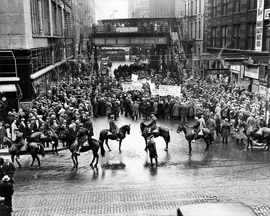Title: Panic in Paradise: Florida’s Banking Crash of 1926
Author: Raymond B. Vickers
Data: University of Alabama Press, 312 pages
Reviewed by Simon Barker-Benifield
Willie Sutton may have known about a lot about robbing banks, but he missed a golden opportunity in Florida in the 1920s. Some of the people doing the robbing then didn’t even bother to wear masks. They didn’t need to: the owned the banks. When they finished stealing, the banks collapsed.
If you think a comprehensive history of a banking crash that happened 70 years ago would be interesting but irrelevant today, think again. The parallels between what happened in the late 1980s are too close for comfort. Then, as now, there were bad loans and loans that went bad (there is a difference). There was insider dealing, political payoffs, regulatory abuse, rankly unsafe speculation and plain, old-fashion theft.
For example, the mayor of Lake Worth, A.D. Clark, made sure the city used his bank to hold its funds. Then he used neural half of the bank’s capital to speculate in hotel development. The bank collapsed. There was , of course, no FDIC insurance for the depositors then.
Vickers has a nice sense of detail. Take the tale of a banker’s wife who ran up a bill equivalent to 10 percent of the coital of one of her husband’s banks. Her husband, when tried for fraud, attempted to plead insanity as his defense.
Vickers is a lawyer when he is not teaching history at Florida State University. He is also a former Florida banking regulator and knows his business.
One of his substantial accomplishments was just getting the records from the 1920s. His story of industry attempts to keep records sealed is not reassuring because, for the most part, those efforts have been successful. In 33 states records have been destroyed after having been sealed for years. Most recently, the state of Washington and Alabama destroyed their bank records from the 1920s and 1930s.
Vickers says depositors would be able to make more informed decisions if they had more information available. That is debatable. One of the lessons of the 1980s was the inability of honest, competent bankers to guess what was going to happen next in their loan portfolios – and they were keeping the books.
Simon Barker-Benifield, a Tiimes-Union business writer, spent seven years in banking.



